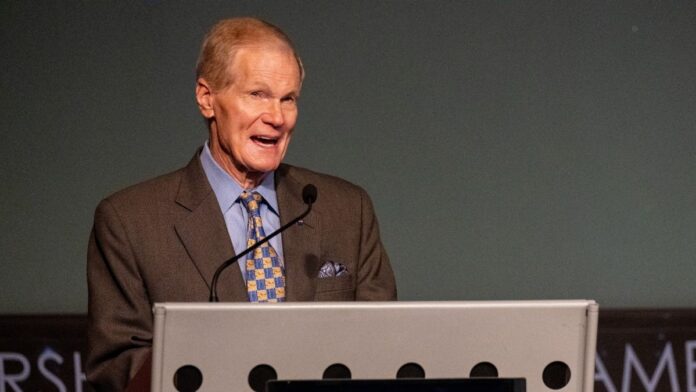NASA Administrator Bill Nelson claims that the U.S. is in a space race with China which could see Beijing attempt to make territorial claims to parts of the moon.
Both China and the United States have lofty goals for lunar exploration and colonization. Both the U.S. and China have major lunar ambitions, with NASA working on its Artemis program to return astronauts to the moon, while China aims to send its own crews to the moon before the end of the decade and build a lunar base in the 2030s. Both powers are considering landing in some of the same areas near the lunar south pole.
“It is a fact: we’re in a space race,” the NASA administrator told Politico (opens in new tab)in an interview published Jan. 1. “And it is true that we better watch out that they don’t get to a place on the moon under the guise of scientific research. And it is not beyond the realm of possibility that they say, ‘Keep out, we’re here, this is our territory.'”
Related: NASA’s head warned that China may try to claim the moon — two space scholars explain why that’s unlikely to happen
Relations between the U.S. and China are complex and have become increasingly strained in recent years. The mistrust between the two powers is also visible in affairs relating to outer space.
Still, there is no legal basis for claiming territory in space. China, like the U.S. and 132 other countries, is a signatory to the 1967 Outer Space Treaty, which states that “Outer space, including the moon and other celestial bodies, is not subject to national appropriation by claim of sovereignty, by means of use or occupation, or by any other means.”
Nelson, however, points to Chinese behavior and territorial claims in the South China Sea as a possible indicator of future claims being made on the moon.
Chinese space industry figures have moved to refute Nelson’s latest claims. “We carry out spaceflight to develop high technology and improve economic growth and people’s living standards,” Yang Yuguang, a senior space industry observer in Beijing and vice-chair of the International Astronautical Federation’s space transportation committee, told state media outlet China Daily (opens in new tab). “We don’t take part in a space race with any other countries because competition in this regard is meaningless,” Yang added.
Nelson appeared to suggest that cooperation with China could be possible during the International Astronautical Congress in Paris in September, despite existing congressional barriers to NASA engaging with Chinese entities. The former Florida senator and astronaut stated however that China would need to be more open and transparent regarding its plans for space.
The chairperson of China’s main space contractor, the China Aerospace Science and Technology Corporation (CASC), which makes the country’s Long March rockets, space station modules and other spacecraft, recently listed a number of concerns created by the U.S. position on China.
Wu Yansheng stated that CASC faces challenges to its plans due to conditions created by the U.S. such as “restarting great power competition,” being kept out of the International Space Station program and Chinese aerospace firms such as CASC being added to U.S. export blacklists.
Wu also claimed that the U.S. is seeking to seize strategic space resources including specific orbits, locations and radio frequencies, SpaceNews (opens in new tab)reported last month. China has also earlier voiced concerns over SpaceX’s Starlink megaconstellation of communications satellites.
Follow us on Twitter @Spacedotcom (opens in new tab) or on Facebook (opens in new tab).

